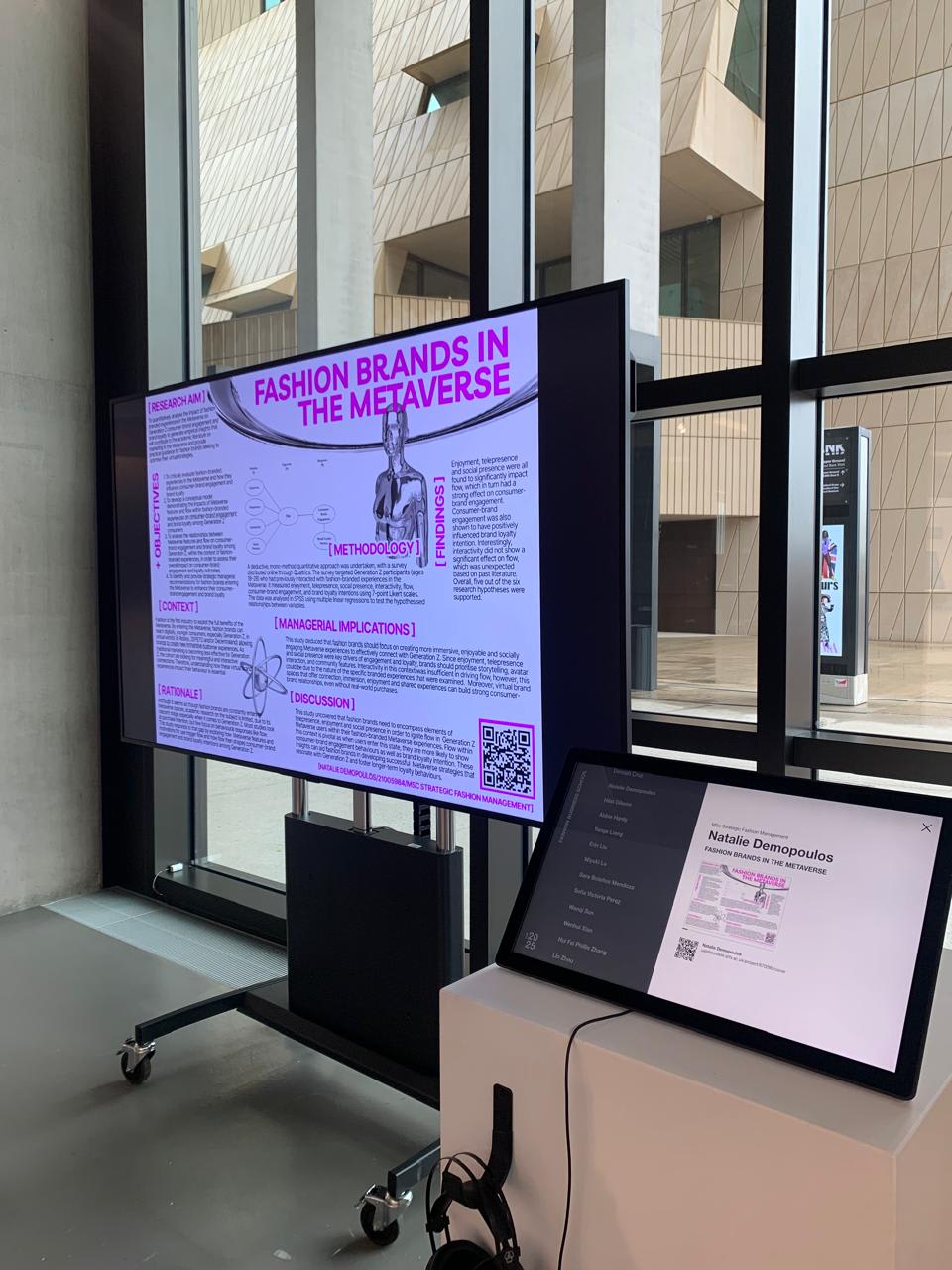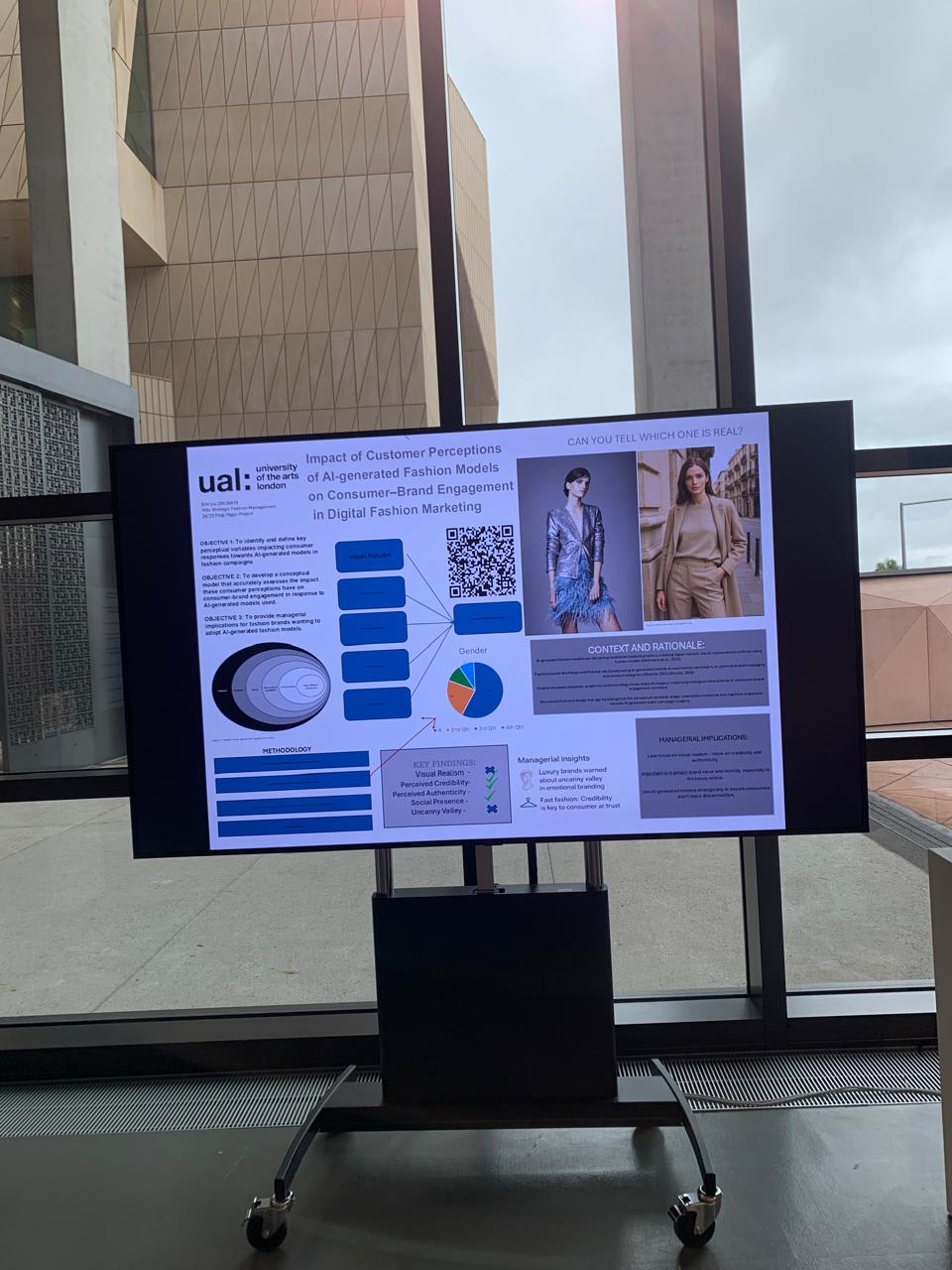
A Cautious Look Into Fashion Consumerism- Postgraduate Showcase at London College of Fashion

- Written byAndrea Gutierrez
- Published date 19 August 2025

Post-Grad Ambassador Andrea Gutierrez went to London College of Fashion to explore the Postgraduate Degree 2025 Shows.
During this year’s end-of-course showcase, we were delightfully invited to witness the research, the projects and the proposal from Postgraduate students at London College of Fashion.
It is quite refreshing to understand how some trends and purchasing habits came to be, especially those of fast fashion and the overwhelming amount of styles and tendencies arising almost daily.
What experiences and guarantees are brands providing to retain consumers?
Opening new debates in trends, consumers behaviours and future practices, here is an overview of their investigations and conclusions.

MSc Strategic Fashion Management graduate, Natalie Demopoulos through her dissertation Fashion Branded Experiences in The Metaverse: A Study on Generation Z Consumer-Brand Engagement and Brand Loyalty Intention created a very compelling study on how fashion brands are using Metaverse platforms (e.g. Roblox and Decentraland) to create interactive, gamified, and socially connected brand experiences, in an attempt to attract younger consumers.
On her studies she found how brands are learning the behaviour and preferences of the younger generations by offering experiences that are appealing and resonate with their daily life and customs. For brands to create meaning and procure a legacy, this might be a very interesting resource to consider.
Another pressing topic regarding fashion and creativity is the usage of AI, specifically when it’s being used to sell a product and the consumer is then exposed to marketing that is not an accurate representation of what a human does.
In Erin Liu’s work titled None Of It Is Real the theme of how the fashion industry continuously adopts AI powered technologies is explored. The aim was to understand how consumer perceive the AI generated models used in visual campaigns, even posing the question if we are able to tell that they are not human. With a carefully planned methodology and research, their findings signal the need to focus on credibility, which then ties the campaign to a premise that can be valuable and authentic to the consumer.

Trends have also found a way to permeate consumer’s minds by adding beloved characters and pop-icons. Many viral products found their success by linking their products to something that could hit the nostalgia or fanatism of consumers, creating a more desirable piece.
According to Wanqi Sun’s research, character and entertainment-licensed (C&EL) fashion products have become a powerful means through which Generation Z expresses personal identity, subcultural belonging, and digital social engagement. With Gen Z being the biggest target audience of fashion trend and digital spaces, this project puts on the table the necessary elements to understand what drives them to purchase licensed fashion. It can also be argued that this strategy has been overused by brands to attract new costumers and grow sales numbers, however, the evidence suggests that (Gen Z) consumers favour aesthetics and cultural symbolism, therefore the spectrum of possibilities and novelty remains growing as it changes to adapt to new trends.

Fashion inarguably is a medium to find identity and self-expression, with tactics that persuade us into integrating to a certain purchasing group. No matter how much on trend we think we are, it seems like there is always something new in the market for us to keep up with. We can still uphold some power in the choices we make, the brands we consume and how much we participate into fuelling a certain fashion tendency, which reflects on the importance for projects like the ones presented in this year’s showcase to be promoted.
We are all consumers, and by understanding how brands cater to us and attempt to understand us, it becomes easier to be more selective and reinforce our individuality through the behaviour we choose to perform when it comes to making those choices.
Post-Grad Stories
Post-Grad Stories is a thriving online platform of postgraduate voices. Here you can share thought-provoking experiences, practices, thoughts and articles about what matters to you.
Download the PDF Guide to writing articles for Post-Grad Stories.
UAL Post-Grad Community
Established in 2013, Post-Grad Community is an inclusive platform for all UAL postgraduate students to share work, find opportunities and connect with other creatives within the UAL and beyond. Find out more.